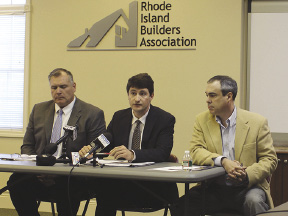If Rhode Island's construction industry were operating at 2001 levels, the state's January 2014 unemployment rate would have been 7.3% instead of 9.2%. This would have dropped the joblessness level from first in the nation to 14th.
That's not only because construction jobs pay more, but because the industry also supports jobs in many other sectors of the economy.
Those were among the many points made by Bryant University economist Edinaldo Tebaldi on April 22nd as members of the media gathered at Rhode Island Builders Association headquarters for the official release of his groundbreaking report: The Economic Impact of the Construction Industry on the Economy of Rhode Island in 2013.
Reporters from television channels 10 and 12 were present, along with WPRO Radio. Those media and newspapers, including the Providence Journal and Providence Business News, carried the story throughout the state.
The report, assembled by Dr. Tebaldi for the Rhode Island Construction Industry Coalition, uses hard numbers to highlight the industry's crucial importance, then recommends ways for state policymakers to help strengthen it.
According to the report, the construction industry in 2013:
* Generated $29 million in personal income tax revenues for the state and $156.6 million in non-income state and local tax revenue;
* Supported 29,916 jobs (6.4% of non-farm employment), including 16,307 direct jobs and 13,609 jobs induced by construction;
* Added $3.9 billion to the state's output, representing 7.7% of Rhode Island's gross domestic product (GDP);
* Created $1.35 billion in income for Rhode Island households.
"What we call the 'multiplier effect' is an important factor here. Benefits from construction activity spill over into other sectors of the economy, directly and indirectly," said Dr. Tebaldi.
Along with construction employment and increased tax revenue, he cited building-material, appliance, furniture and many other types of purchases that result from home building.
He also mentioned that wages in construction work tend to exceed those in non-construction jobs. In 2012, for example, the average annual construction wage was $53,498, 20% higher than the average wage for all industries, according to the report. It cites a serious hit to the industry from 2005 to 2010, however. Rhode Island's construction industry lost about 7,550 jobs, or 26% of employment, during that period, according to the document.
At the same time, Dr. Tebaldi made the point that high construction costs have more to do with Rhode Island's business climate and unwieldy regulations than with labor costs.
Also speaking at the press conference were RIBA executive director John Marcantonio and John Sinnott of Gilbane Building Co., both representing the Rhode Island Construction Industry Coalition.
"This report confirms the importance of the construction industry in Rhode Island's economy. And as construction goes, so goes our state," said Marcantonio. "It's vital that we get the industry going again and contributing again."
"We are in an unprecedented time in Rhode Island's history," Sinnott added. "Our neighbors and friends are struggling to find work, development has nearly ground to a halt, and there is little confidence in a turnaround. Collectively, from all corners of the construction industry, we've come together as the Construction Industry Coalition, both union and merit shops, home builders and road builders, commercial and institutional builders, to determine what is driving the stagnation and to initiate efforts that will help turn the state's economy around."
The report also suggests policy changes to bring back construction. These include:
* Review and implement reforms in the construction permitting process.
* Identify issues that delay development and increase construction costs.
* Assess opportunities to build and remodel public and private properties across cities and towns.
Rhode Island "has to align its cost structure, improve productivity and seize all opportunities to expand construction activities as a strategy for fostering job and income creation..." the report concludes.
Along with RIBA, the Coalition includes the Associated Builders & Contractors, the Associated General Contractors, the Construction Industries of Rhode Island and Build Rhode Island.
View the full report at RIBA's website, www.RIBuilders.org.
Paul Eno is the owner and editor-in-chief of New River Press, Woonsocket and is the editor of the monthly RIBA newsletter, The Rhode Island Builder Report.









